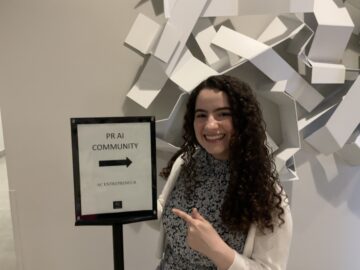Exploring Digital Safety Through Cultural Connection in Puerto Rico
July 25, 2025
Alexandra Gonzalez is an information science doctoral student whose summer research is focused on Puerto Rican youth’s conceptualization of digital safety within their cultural context primarily through work in San Juan, Puerto Rico.

Describe the location of your field research.
San Juan, Puerto Rico, which is currently a U.S. territory.
What’s the focus of your research?
My research examines how Puerto Rican youth conceptualize digital safety within their cultural context, investigating how their unique perspectives can inform more effective and culturally resonant AI safety interventions. This focus represents the broader direction I plan to pursue in my dissertation work, with this summer project serving as a preliminary exploratory investigation to refine my approach.
What do you hope will be the impact of this work?
I hope this research will offer policymakers insights into creating culturally grounded digital safety programs for multilingual communities, beginning in Puerto Rico but with broader applications. The findings should contribute to more inclusive approaches that better protect vulnerable youth across diverse cultural contexts.

How will field research advance your understanding of your research in a way that classes and/or theory do not?
Fieldwork will deepen my understanding through cultural immersion, facilitating meaningful face-to-face conversations and fostering strong community relationships. These community connections are vital not only for my summer research but also for future collaboration when presenting findings to policymakers. Developing trust is essential for participatory work, ensuring that technical challenges are accurately conveyed while providing lasting benefits to the community beyond the completion of my research.
What has surprised you about your experience?

The warmth from both the study participants and the community was extraordinary. After the interviews, I was hugged and encouraged to return, making me feel as if I had made friends rather than just collected research data. My desire to help and connect with the culture and community was warmly received, even by those I had met briefly during a car ride, while buying ice cream, or just walking by on the street.
How did Cornell programs and/or faculty mentors help connect you with the opportunity to carry out this research?
My advisor, J. Nathan Matias, and the Citizens and Technology Lab as a whole, supported my idea the moment I approached them with it, as well as helping me develop the skills necessary to be an effective qualitative researcher. Dr. Matias was also the person who pointed me in the right direction for finding an appropriate funding option through Cornell. I am very thankful to the Graduate School for supporting me in my research endeavors and in growing my Spanish language skills, and I would like to express my gratitude to the Einaudi Center for also funding my trip.

What would you say to students considering applying to Cornell for grad school?
Coming to Cornell has been the best experience of my life. The faculty and staff are helpful, considerate, and inspirational. Although the Ithaca area ranks among the most stunning places I have ever lived, the people there are undoubtedly some of the most welcoming individuals I have had the pleasure to work alongside or befriend. This school deeply emphasizes interdisciplinary collaboration, making the mission of ‘any person, any study’ feel like much more than a mere slogan. This genuine academic freedom initially drew me here, and my advice to hesitant prospective students is simple: commit to Cornell, and you won’t regret it.
